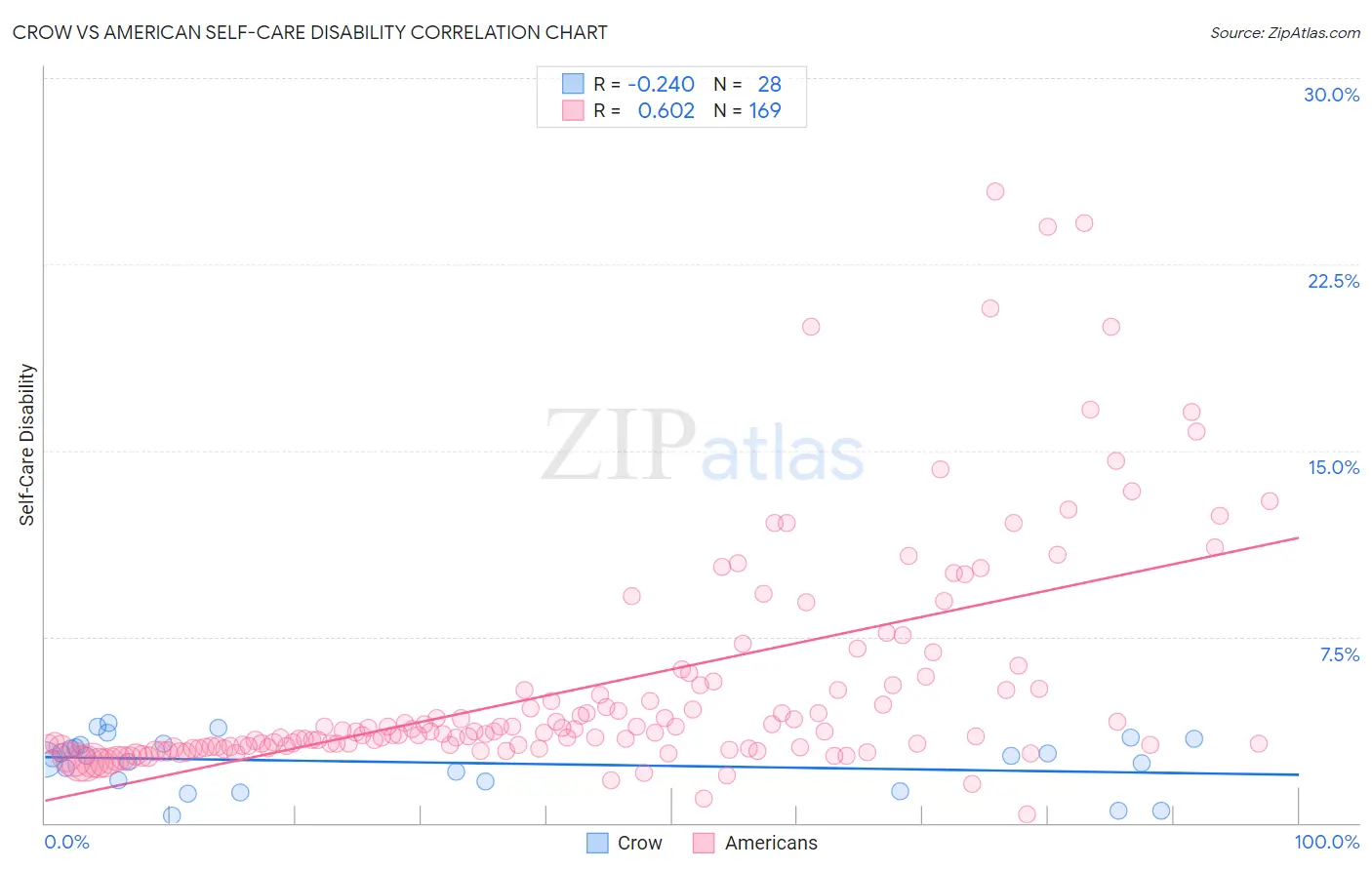Crow vs American Self-Care Disability
COMPARE
Crow
American
Self-Care Disability
Self-Care Disability Comparison
Crow
Americans
2.5%
SELF-CARE DISABILITY
15.2/ 100
METRIC RATING
197th/ 347
METRIC RANK
2.8%
SELF-CARE DISABILITY
0.0/ 100
METRIC RATING
298th/ 347
METRIC RANK
Crow vs American Self-Care Disability Correlation Chart
The statistical analysis conducted on geographies consisting of 59,179,234 people shows a weak negative correlation between the proportion of Crow and percentage of population with self-care disability in the United States with a correlation coefficient (R) of -0.240 and weighted average of 2.5%. Similarly, the statistical analysis conducted on geographies consisting of 579,144,180 people shows a significant positive correlation between the proportion of Americans and percentage of population with self-care disability in the United States with a correlation coefficient (R) of 0.602 and weighted average of 2.8%, a difference of 9.8%.

Self-Care Disability Correlation Summary
| Measurement | Crow | American |
| Minimum | 0.32% | 0.36% |
| Maximum | 4.0% | 25.5% |
| Range | 3.7% | 25.1% |
| Mean | 2.4% | 5.5% |
| Median | 2.7% | 3.6% |
| Interquartile 25% (IQ1) | 1.7% | 3.0% |
| Interquartile 75% (IQ3) | 3.2% | 5.5% |
| Interquartile Range (IQR) | 1.5% | 2.5% |
| Standard Deviation (Sample) | 1.1% | 4.6% |
| Standard Deviation (Population) | 1.0% | 4.6% |
Similar Demographics by Self-Care Disability
Demographics Similar to Crow by Self-Care Disability
In terms of self-care disability, the demographic groups most similar to Crow are Immigrants (2.5%, a difference of 0.020%), Immigrants from Southern Europe (2.5%, a difference of 0.030%), Korean (2.5%, a difference of 0.030%), Immigrants from Ghana (2.5%, a difference of 0.050%), and Immigrants from Western Africa (2.5%, a difference of 0.19%).
| Demographics | Rating | Rank | Self-Care Disability |
| Sioux | 24.6 /100 | #190 | Fair 2.5% |
| Moroccans | 22.9 /100 | #191 | Fair 2.5% |
| Soviet Union | 22.2 /100 | #192 | Fair 2.5% |
| Ukrainians | 21.4 /100 | #193 | Fair 2.5% |
| Immigrants | Germany | 17.9 /100 | #194 | Poor 2.5% |
| Immigrants | Southern Europe | 15.6 /100 | #195 | Poor 2.5% |
| Koreans | 15.5 /100 | #196 | Poor 2.5% |
| Crow | 15.2 /100 | #197 | Poor 2.5% |
| Immigrants | Immigrants | 15.0 /100 | #198 | Poor 2.5% |
| Immigrants | Ghana | 14.7 /100 | #199 | Poor 2.5% |
| Immigrants | Western Africa | 13.3 /100 | #200 | Poor 2.5% |
| Immigrants | South Eastern Asia | 12.9 /100 | #201 | Poor 2.5% |
| Slovaks | 12.6 /100 | #202 | Poor 2.5% |
| Immigrants | Lebanon | 12.4 /100 | #203 | Poor 2.5% |
| Immigrants | Bahamas | 11.9 /100 | #204 | Poor 2.5% |
Demographics Similar to Americans by Self-Care Disability
In terms of self-care disability, the demographic groups most similar to Americans are Immigrants from Guyana (2.8%, a difference of 0.090%), West Indian (2.8%, a difference of 0.12%), Immigrants from Portugal (2.8%, a difference of 0.20%), Immigrants from Fiji (2.8%, a difference of 0.56%), and Barbadian (2.7%, a difference of 0.63%).
| Demographics | Rating | Rank | Self-Care Disability |
| Guyanese | 0.0 /100 | #291 | Tragic 2.7% |
| Central American Indians | 0.0 /100 | #292 | Tragic 2.7% |
| Belizeans | 0.0 /100 | #293 | Tragic 2.7% |
| Blackfeet | 0.0 /100 | #294 | Tragic 2.7% |
| Barbadians | 0.0 /100 | #295 | Tragic 2.7% |
| Immigrants | Portugal | 0.0 /100 | #296 | Tragic 2.8% |
| West Indians | 0.0 /100 | #297 | Tragic 2.8% |
| Americans | 0.0 /100 | #298 | Tragic 2.8% |
| Immigrants | Guyana | 0.0 /100 | #299 | Tragic 2.8% |
| Immigrants | Fiji | 0.0 /100 | #300 | Tragic 2.8% |
| Pima | 0.0 /100 | #301 | Tragic 2.8% |
| Immigrants | St. Vincent and the Grenadines | 0.0 /100 | #302 | Tragic 2.8% |
| Immigrants | Belize | 0.0 /100 | #303 | Tragic 2.8% |
| Cree | 0.0 /100 | #304 | Tragic 2.8% |
| Immigrants | West Indies | 0.0 /100 | #305 | Tragic 2.8% |